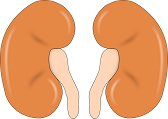Can Prostatitis Cause Kidney Pain?
Date:2019-10-22 click:0
If prostatitis can not be treated in time, it can lead to prostatic hyperplasia, which will oppress the bladder outlet, and the urine will be accumulated in the body, fail to excrete normally and produce residual urine.

Residual urine is a good medium for bacterial reproduction. These bacteria will invade bladder tissue when it is damaged, causing urinary tract infection and damage to the bladder mucosa defense mechanism, so it is very easy to cause urinary tract infection and pyelonephritis.
At this time, if the treatment is not complete, pyelonephritis and hydronephrosis will develop into nephritis, which will damage the kidney function and finally develop into uremia. Kidney cysts and various types of nephritis will cause kidney pain due to interstitial kidney damage, so prostatitis is likely to cause kidney pain.
Therefore, when prostatitis is found, it should be treated in time and thoroughly to prevent it from developing into uremia. Antibiotic therapy is a common method for the treatment of prostatitis, and the efficacy of the drugs will diffuse into the prostatic fluid from plasma. Most of them are effective for Gram-positive bacilli causing urinary tract infection.

However, the therapeutic effect is not ideal because they can not penetrate the lipid membrane of the prostatic epithelium and enter into prostatic acini. Because antibiotics are not easy to reach the effective concentration in the prostate and affect the curative effect, there is a treatment method of directly injecting antibiotics into the prostate.
The specific method is to inject the medicine directly into the prostate gland through the perineum or directly into the prostate lesions under the guidance of B-ultrasound. The main advantage of this treatment is that the drug is injected directly into the prostate; it is easy to spread and reach an effective antibacterial concentration.
But it also has some shortcomings that are not easy to overcome. A puncture can damage the surrounding tissue and cause hematuria. It can cause pain and discomfort, and it is difficult for patients to accept, but also easy to cause repeated infection of the prostate. A repeated puncture can also cause hyperplasia of prostatic fibrous tissue and prostatic sclerosis, making it more difficult for antibiotics to penetrate people, and making it difficult to discharge prostatic fluid.

Therefore, we must be careful when choosing this treatment method. Only when other methods are ineffective, can we consider this method, and the puncture should not be too frequent. Those treatments above can not avoid the increase of side effects and long-term drug-resistant bacteria, as well as liver and kidney damage and other side effects.
In contrast, the safety of traditional Chinese medicine is higher, such as the common Chinese medicine Diuretic and Anti-inflammatory Pill. Modern technology overcomes the shortcomings of slow onset and unstable curative effects of traditional Chinese medicine.

Due to the 50 kinds of natural herbs in the formula and strict compatibility, the drug effect can reach the focus directly, not only has high safety and no drug resistance but also has the advantage of preventing a recurrence. In addition, the combination of modern medicine with herbal medicine can improve the efficacy of chemical medicine and reduce the side effects, which is an ideal choice for chronic prostatitis patients.



